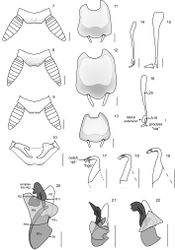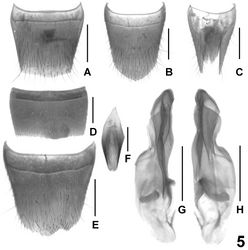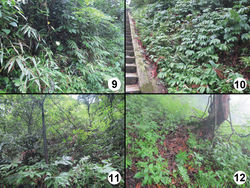Lathrobium conexum
| Notice: | This page is derived from the original publication listed below, whose author(s) should always be credited. Further contributors may edit and improve the content of this page and, consequently, need to be credited as well (see page history). Any assessment of factual correctness requires a careful review of the original article as well as of subsequent contributions.
If you are uncertain whether your planned contribution is correct or not, we suggest that you use the associated discussion page instead of editing the page directly. This page should be cited as follows (rationale):
Citation formats to copy and paste
BibTeX: @article{Assing2013ZooKeys277, RIS/ Endnote: TY - JOUR Wikipedia/ Citizendium: <ref name="Assing2013ZooKeys277">{{Citation See also the citation download page at the journal. |
Ordo: Coleoptera
Familia: Staphylinidae
Genus: Lathrobium
Name
Lathrobium conexum Assing & Peng sp. n. – Wikispecies link – ZooBank link – Pensoft Profile
Type material
Holotype ♂: ‘CHINA: Sichuan Prov., Emeishan City, Mt. Emeishan, 29°33'N, 103°23'E, 27.vii.2012, alt. 1,100 m, Dai, Peng & Yin leg. / Holotypus ♂ Lathrobium conexum sp. n., det. Assing & Peng 2012' (SNUC). Paratypes: 2♂♂, 2♀♀: same data as holotype (SNUC).
Etymology
The specific epithet (Latin, adjective: connected) refers to the merged ventral process and dorsal plate of the aedeagus and emphasizes the hypothesized close relationship of Lathrobium conexum to Lathrobium iunctum and Lathrobium coniunctum.
Description
Body length 8.8–10.0 mm; length of forebody: 4.1–4.5 mm. Habitus as in Fig. 2C. Head noticeably transverse, 1.05–1.10 times as broad as long. Other external characters as in Lathrobium iunctum.
Male. Sternite VII (Fig. 5D) distinctly transverse and with relatively small, subelliptic, and shallow posterior impression in asymmetric position, this impression with defined and extensive cluster of numerous distinctly modified, short and stout black setae; posterior margin weakly convex. Sternite VIII (Fig. 5E) weakly transverse, with small and shallow impression in asymmetric position posteriorly, this impression with few short black setae; posterior excision shallow and in distinctly asymmetric position. Sternite IX as in Fig. 5F. Aedeagus (Figs 5G, H) approximately 1.4 mm long (from base to apex of dorsal plate) and distinctly asymmetric; ventral process and dorsal plate fused; basal portion of aedeagus small; internal sac with weakly sclerotized basal sclerite.
Female. Sternite VIII (Fig. 5B) oblong, its posterior margin strongly convex. Tergite IX with short and undivided median portion and with moderately long postero-lateral proce sses; tergite X approximately 2.3 times as long as tergite IX in the middle (Fig. 5C).
Comparative notes
As can be inferred from the similarly derived morphology of the aedeagus (ventral process and dorsal plate fused and distinctly asymmetric; small basal portion; internal sac with weakly sclerotized basal sclerite), the similar modifications of the male sternite VII (posterior impression in asymmetric position and with cluster of distinctly modified setae), the similar female secondary sexual characters, and the practically identical external characters, Lathrobium conexum is closely allied to Lathrobium iunctum and Lathrobium coniunctum. The similar modifications of the male sternite VIII would suggest that it may be most closely related to the latter.
Distribution and natural history
This species is currently known only from the type locality. The specimens were collected by sifting leaf litter and humus from the floor of hardwood forest with Kalopanax at an altitude of 1,100 m (Fig. 11).
Original Description
- Assing, V; Peng, Z; Zhao, M; 2013: On the Lathrobium fauna of the Emei Shan, Sichuan, China (Coleoptera, Staphylinidae, Paederinae) ZooKeys, 277: 47-67. doi
Images
|


